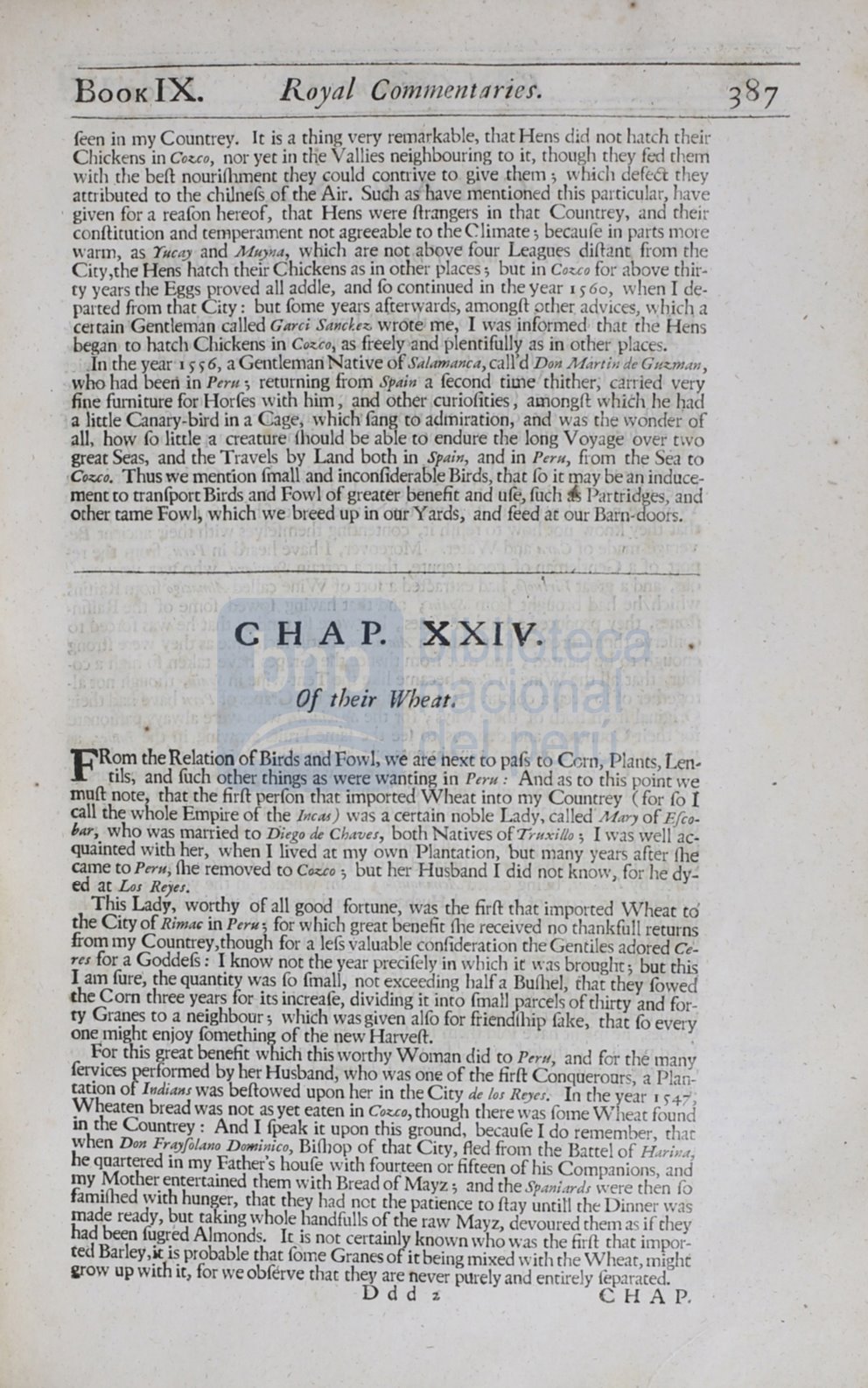

BooKIX.
Royal
Com1nentt1ries.
feen in
my
Countrey.
It
is a thing ve:Y
rer~1arkabl~,
that
~ens
did not hatch their
Chickens
in
Co~co,
nor yet in the
Val11es
ne1~hboun~g
to
It,
thougl~
they fed therrt
with the befi: nouriil1rnenc they could contrive
to
give them; which defea they
attributed to the
chilnefs
of the Air. Such
as have
mentioned this
particular, have
given for a reafon hereof, that Hens were !hangers
~n
that
Countr~y,
and their
confiitution and temperament not agreeable
to
the C
hm~te
; becaufe
m
parts more
warm, as
Tucay
and
Muyna,
~hich ar~
not above four
Le~gues
d1ltant from
t~e
City the Hens hatch their Chickens as mother places; but m
Couo
for above thir-
ty
ye~rs
rhe Eggs proved all addle, and fo continued in the year
15
60~ when~
de-
,
parred from that City : but fome years afterwards,
among~
other advtees, \
hich
a
certain
Gentleman
called
Garci Sanckez.
wrote me, I was
mformed that
the
Hens
began to hatch Chickens in
Co~co
1
as
freely and plentifully
as
in other
place .
Jn
the
year
I)
56,
a
Gentlem~n
Native
of.Salamanca,
ca!l'd
Don.Marti,1
de
_Gu~man,
who
had
beeri
in
Perit;
returning
from
Spam
a
fecond
t101e thither, earned very
fiQ.e furniture for Horfes with
him~
and other
,cur~ofi~ies,
amongfi:
which_he
bad
a little Canary-bird in a Cage, which fang to adrturauon, and
was
the wonder of
all, ho\V
fo
little a creature fhould be
abl~
to
en9ure
th~
long
Voyage over
t
vo
great Seas,
and
the Travels
by
Land both m
Spam,
and m
Peru,
from the ea
to
Co~o.
Thus we mention
f
rnall and inconfiderable
Birds,
that
fo
it
may be an induce–
ment co tranfportBirds
and Fowl of
greater
benefit and ufe, fuch
, Partridges, and
ocher tame
Fowl;,
which we
breed
up
in
oar Yards,
and feed
ac
our
Barn-doors.
CH AP.
x·x1v.
Of their Wheat.
F
Rom
theRelatiori of
Birds
and
Fowl,
we
are
hext
to
pafs
to Corn,
Plants,
Len4
tils, and fuch other things as were wanting in
Peru:
And
as
to this point we
mufr note
tha~
the firfi perfon that imported Wheat into my Coumrey (for fo I
call
the whole Empire
of
the
IncM)
was a
certain
noble
Lady, called
Mary
of
Efco–
bar,
who was
married
to
n ·iego
de
Chavu,
both Natives of
Truxillo;
I
was well ac–
quainted with her, when
I
lived at
my
own Plantation, but many years after
fhe
came to
Peru,
ilie removed
to
Couo
;
but her
Husband
I did not knm", for
he
dy–
ed
at
Los Reje1.
This
Lady, worthy of
all
good
fortune, was
the firfi that imported
Wheat
to
the
City
of
Rimar;
in
Peru;
for which
great benefit fhe received no thankfoll returns
from
my Countrey,
though
for a
lefs
valuable confideration the Gentiles adored
Ce–
re1
for
a
GoddetS :
I
know not the year precifely in
which
it
\,·as brought; but
th~
I
am fore, the quantity
was
fo
fmall,
not exceeding halfa Bufhel,
that
they
fowed
the Com three
ye~rs
for
its
inc~eafe, div~ding
it into
f~all ~a~ceJs
of thirty and for–
ty
Granes
to a
neighbour; which was
given
alfo
for fnend!h1p fake, that
fo
every
one.might enjoy fomething of the newHarvefi.
For this great benefit which this
worthy
Woman did to
Peru,
and
for the many
fervices
performed
by her Husband, who was one of the firft Conqueronrs, a Plan–
tation of
India111
was
befiowed
upon her in
the
City
de los
Reyes.
In
the year
1
54
yvheaten bread was
not as
yet eaten in
Couo,
though there
was
fame Wheat
found
m the Countrey: And I fpeak it upon this ground, becaufe I do remember, that
when
Don Frayfolano Dominico,
Bifhop of that City, fled from the Bartel of
H arina
he quartered in
my
!athees houfe
with
fourteen or fifteen of his Companions,
and
my
;Mathe~
entertamed them
w
uh Bread ofMayz ; and the
Spaniards
vvere then
fo
famtfhed
wnh
hung~r,
that they had not
the
patience
to
fray untitl the Dinner was
made ready, but takrng whole
~andfulls
of
the
raw Mayz, devoured them as if they
h~d
been
f~g~ed
Almonds.
Ir
is not certarnly known who was the firfi that impor–
ted
Barley,~~
probable that fome Granes of
it
being mixed with the Wheat, might
&row
up
with
it,
for we
obferve
that they are never
purely
and
entirely
feparated.
D d d
:t
CH A
p,














